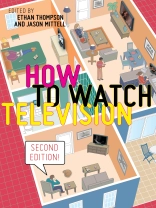A new edition that brings the ways we watch and think about television up to the present
We all have opinions about the television shows we watch, but television criticism is about much more than simply evaluating the merits of a particular show and deeming it “good” or “bad.” Rather, criticism uses the close examination of a television program to explore that program’s cultural significance, creative strategies, and its place in a broader social context.
How to Watch Television, Second Edition brings together forty original essays—more than half of which are new to this edition—from today’s leading scholars on television culture, who write about the programs they care (and think) the most about. Each essay focuses on a single television show, demonstrating one way to read the program and, through it, our media culture. From fashioning blackness in Empire to representation in Orange is the New Black and from the role of the reboot in Gilmore Girls to the function of changing political atmospheres in Roseanne, these essays model how to practice media criticism in accessible language, providing critical insights through analysis—suggesting a way of looking at TV that students and interested viewers might emulate. The contributors discuss a wide range of television programs past and present, covering many formats and genres, spanning fiction and non-fiction, broadcast, streaming, and cable. Addressing shows from TV’s earliest days to contemporary online transformations of the medium, How to Watch Television, Second Edition is designed to engender classroom discussion among television critics of all backgrounds.
To access additional essays from the first edition, visit the ‘links’ tab at nyupress.org/9781479898817/how-to-watch-television-second-edition/.
Mengenai Pengarang
Jason Mittell is Professor of Film & Media Culture at Middlebury College. His books include Genre & Television: From Cop Shows to Cartoons in American Culture, Television & American Culture, and Complex Television: The Poetics of Contemporary Television Storytelling, and Narrative Theory and Adaptation. He is project manager for [in]Transition: Journal of Videographic Film & Moving Image Studies, and author of numerous video essays.












